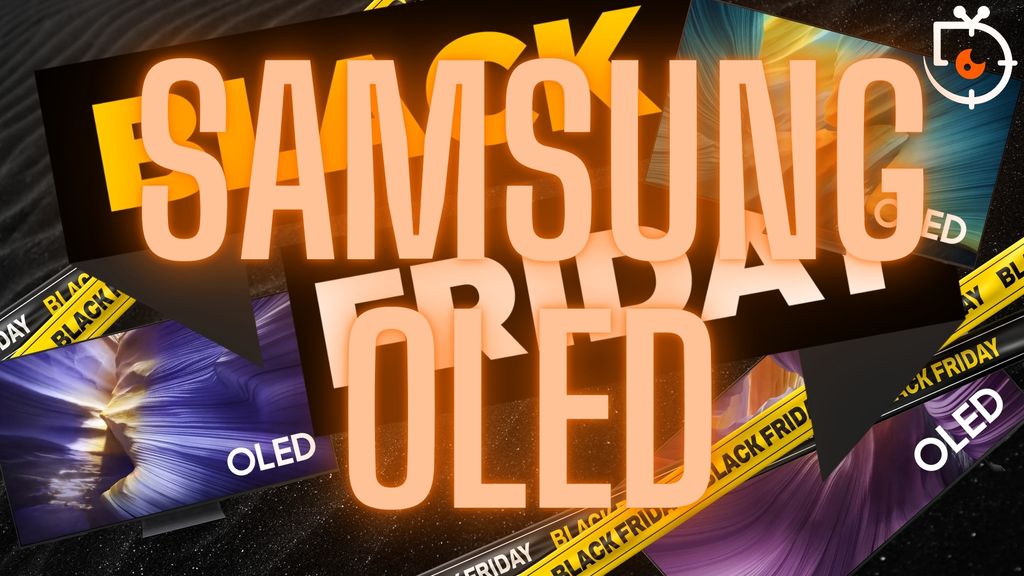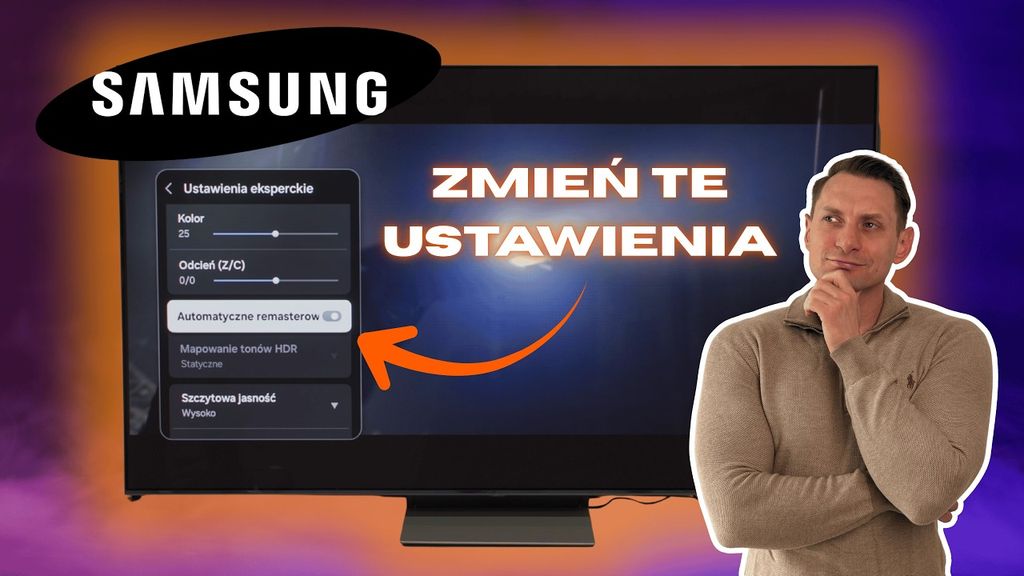- Matching (Score) |
- Our verdict |
- Competing TVs |
- TV appearance |
- Where to buy |
- Contrast and black detail |
- HDR effect quality |
- Factory color reproduction |
- Color reproduction after calibration |
- Smoothness of tonal transitions |
- Image scaling and smoothness of tonal transitions |
- Blur and motion smoothness |
- Console compatibility and gaming features |
- Input lag |
- Compatibility with PC |
- Viewing angles |
- Daytime performance |
- TV features |
- Apps |
- Playing files from USB |
- Sound |
- Panel details
Samsung S85F OLED Review
S85F / FAE / FAU
Available screen sizes:
Diagonal with a different matrix: , ,

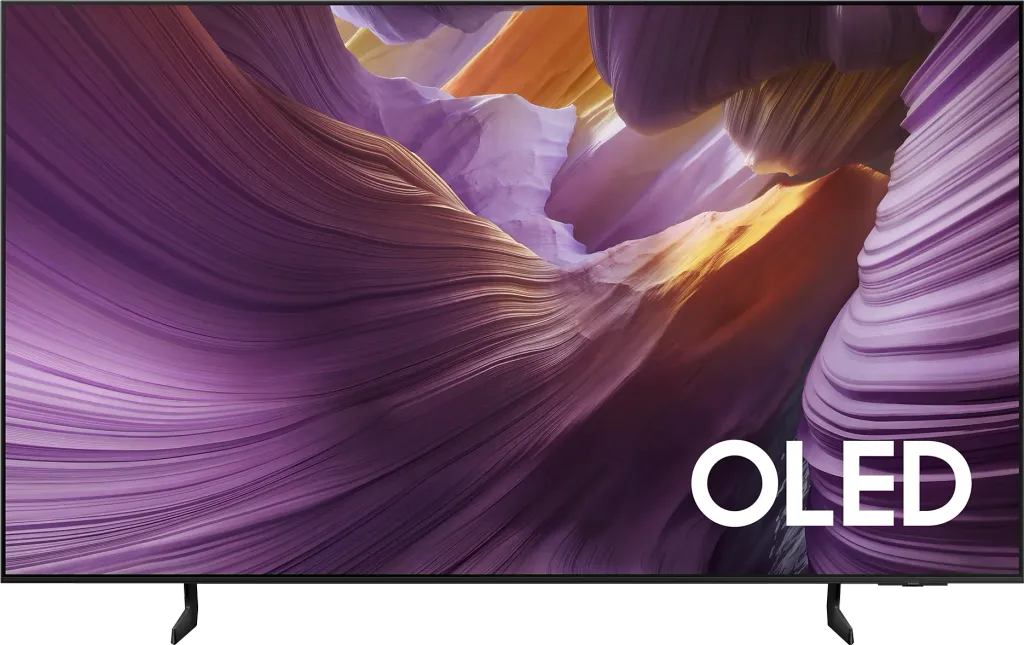
Complete the survey to find out the result
Panel type: QD-OLED Refresh rate: 120Hz Brand: SAMSUNG Resolution: 3840x2160 System: Tizen Model year: 2025
There are models that we look at with admiration, yet at the same time with a slight raise of the eyebrow. And that is exactly the case with the Samsung S85F in the 55-inch version. You may ask us – "but how, why?". Don't get us wrong, we like it when manufacturers surprise us, but in this instance, the surprise is at least double. Because for some reason, Samsung decided that in its theoretically lower OLED model, positioned in the hierarchy below the S90F, it would use... its own QD-OLED matrix.
Sounds like a recipe for success? Perhaps. Or maybe it's just a gimmick that doesn't deliver the expected results in practice. After all, QD-OLED is a technology we usually expect in top models, yet here it finds its way into a television positioned almost in the budget segment. What effects did this produce? We invite you to our original test!
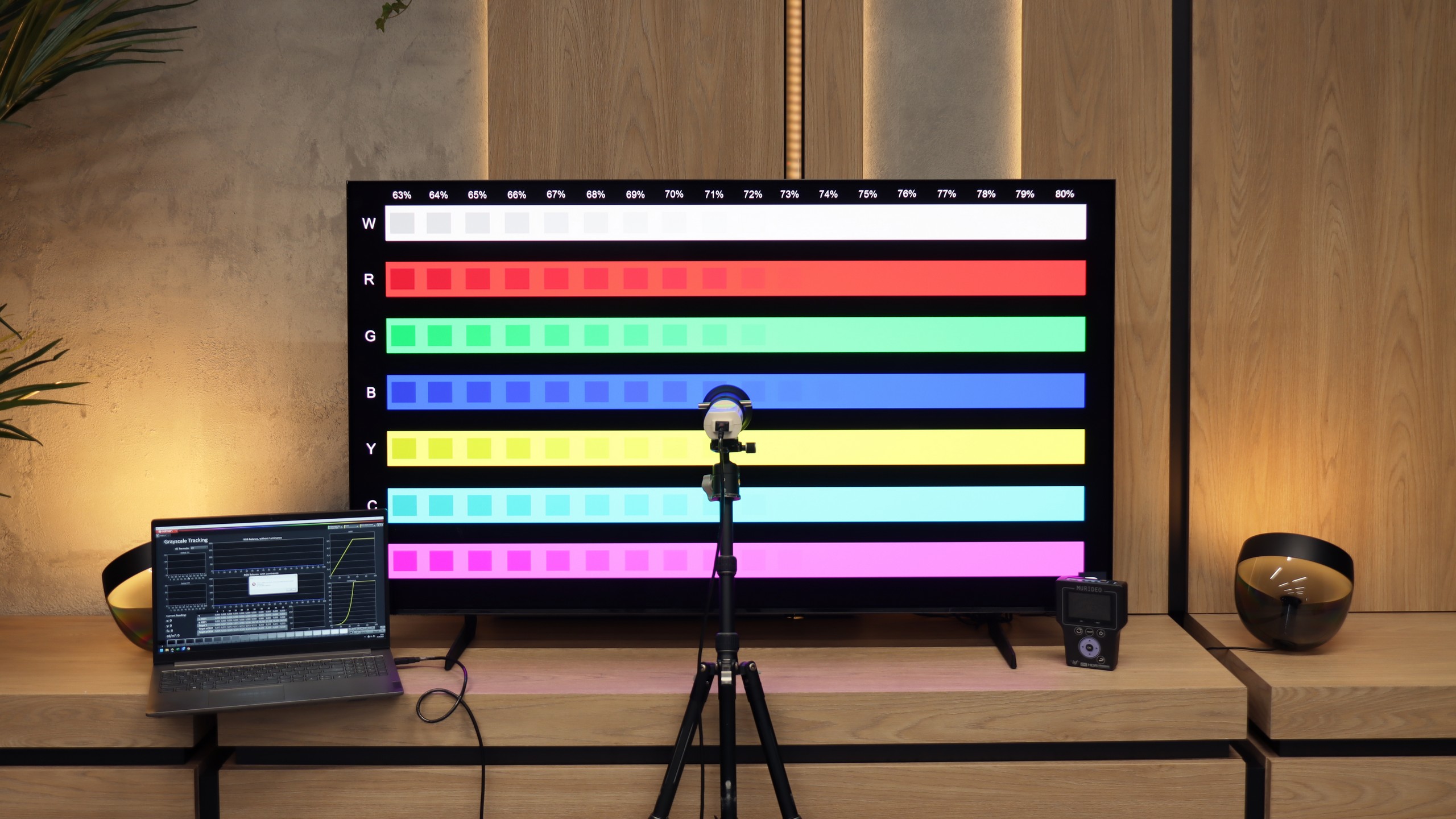
SAMSUNG S85F - Our verdict
8.1
Overall rating
Samsung S85F with a QD-OLED panel can surprise – and it surprises very positively. Even before the tests, we didn't think that in the case of TVs that are talked about in the context of "panel lottery," one could come across something that would benefit the user. However, in this case, particularly in the 55-inch version, it has fully succeeded. The QD-OLED panel, as befits organic technology, offers perfect, almost ideal black and contrast in cinematic conditions. The difference lies, however, in the way colours are reproduced – here it is simply outstanding. The colour gamut coverage is impressive, and after a gentle calibration, the colours become almost exemplary. Motion fluidity is equally high. The 120 Hz panel handles both sports and action films excellently. And if someone plans to connect a console to the S85F, they will receive a complete set of advantages: low input lag, variable refresh rate, Game Bar, and full support for HDMI 2.1. In everyday use, we were assisted by the Tizen system – closed, but extremely well-designed. It responds quickly, offers a rich selection of applications, and add-ons such as AirPlay and voice control make it hard to find something more complete in this category. Indeed, the S85F is not without its flaws. However, the balance of advantages and disadvantages is exceptionally favourable here. One could even get the impression that it is one of the best TVs in its price segment.
[UPDATE] We have updated our 2025 Samsung TV reviews following the release of firmware version 1131, which officially restores the essential HGiG (HDR Gaming Interest Group) support.
Advantages
Amazing black and contrast
Incredible colour palette coverage thanks to the QD-OLED matrix
Great picture in SDR and HDR content
High colour fidelity after calibration
Very good image smoothness – 120 Hz OLED matrix
Rich set of features for gamers: VRR, Game Bar, low input lag
4 HDMI 2.1 ports with full bandwidth of 48 Gbps
Advanced and smoothly operating Tizen system
Solar Remote with multiple options
Disadvantages
No recording function on USB and PiP
No Dolby Vision
Slightly cherry black in very strong external light (not noticeable when viewing in cinema conditions)
Movies and series in UHD quality
8.4
Classic TV, YouTube
9.2
Sports broadcasts (TV and apps)
8.9
Gaming on console
9.6
TV as a computer monitor
7.6
Watching in bright light
5.1
Utility functions
7.3
Apps
9.3
Sound quality
7.2
Complete the survey to find out what fits your preferences
SAMSUNG S85F - Competing TVs in this price range
SAMSUNG S85F - TV appearance
HDMI inputs: 0 x HDMI 2.0, 4 x HDMI 2.1 (48Gbps) Other inputs: Toslink (Optical audio) Outputs: Toslink (Optical audio), eARC (HDMI), ARC (HDMI) Network Interfaces: Wi-Fi 2.4GHz, Wi-Fi 5GHz, Ethernet (LAN) 100Mbps
Build quality: Good
Stand type: Legs
Bezel color: Graphite
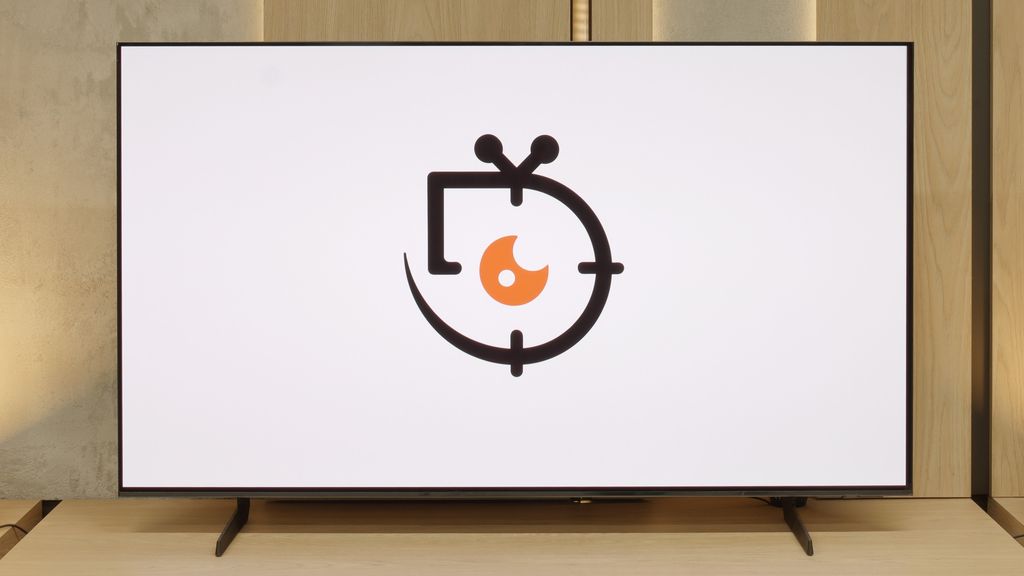
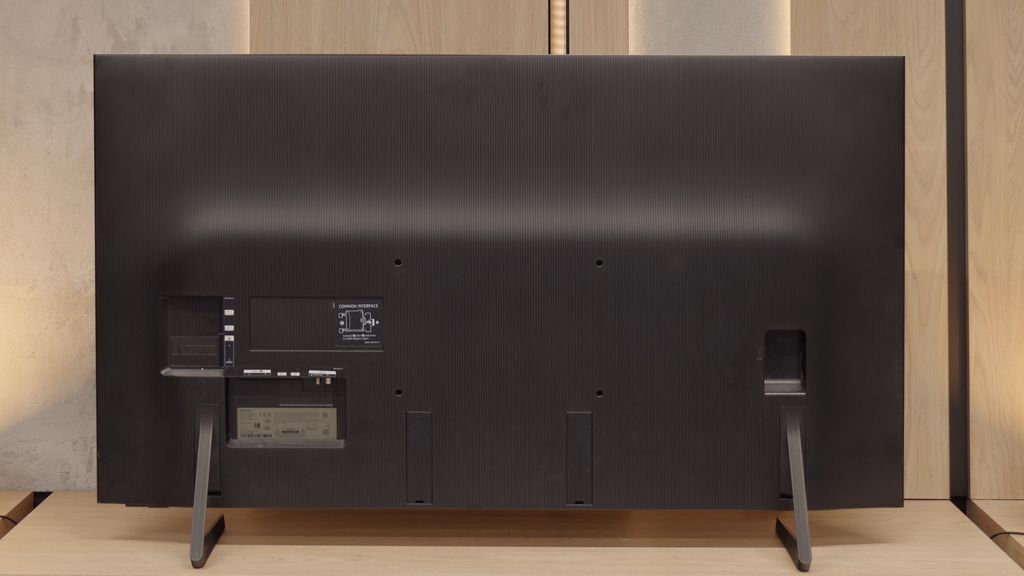
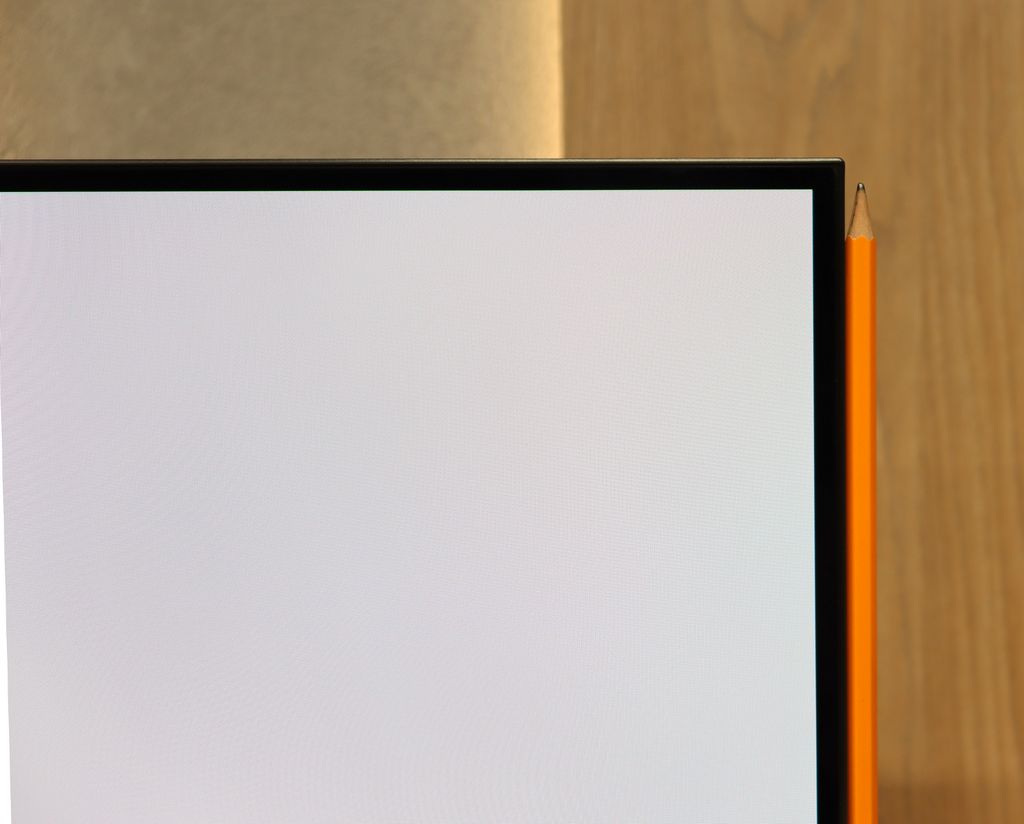
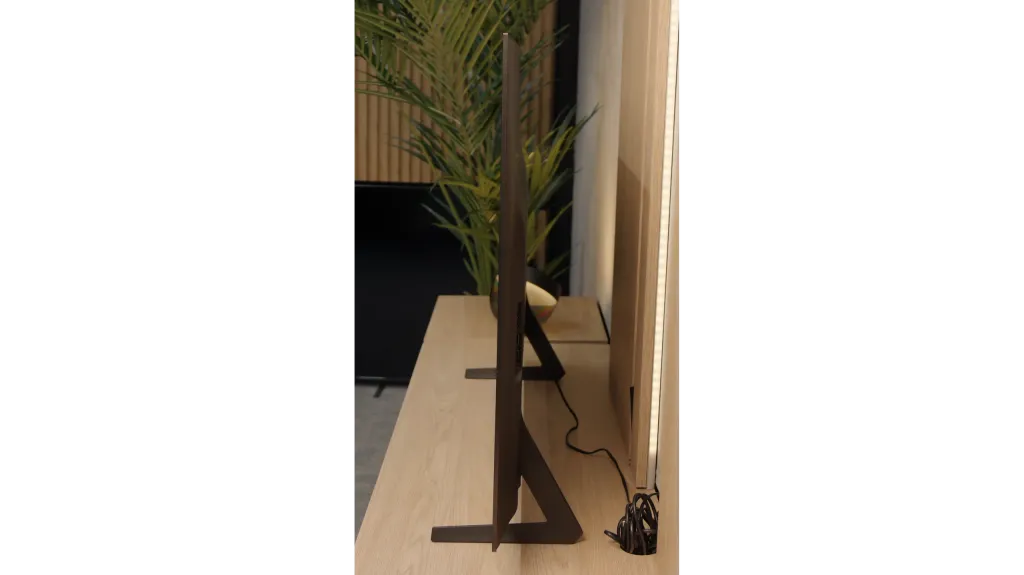
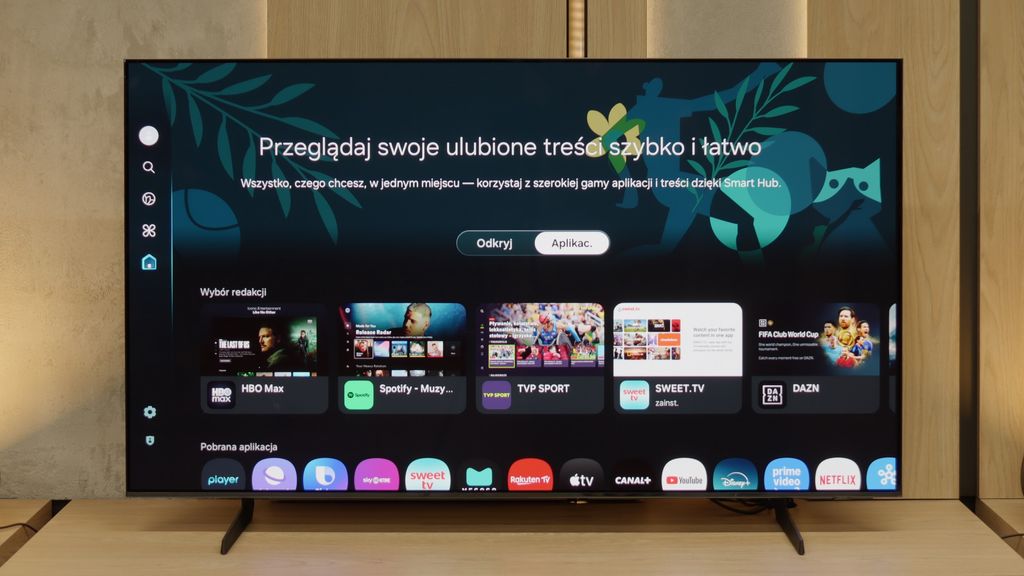
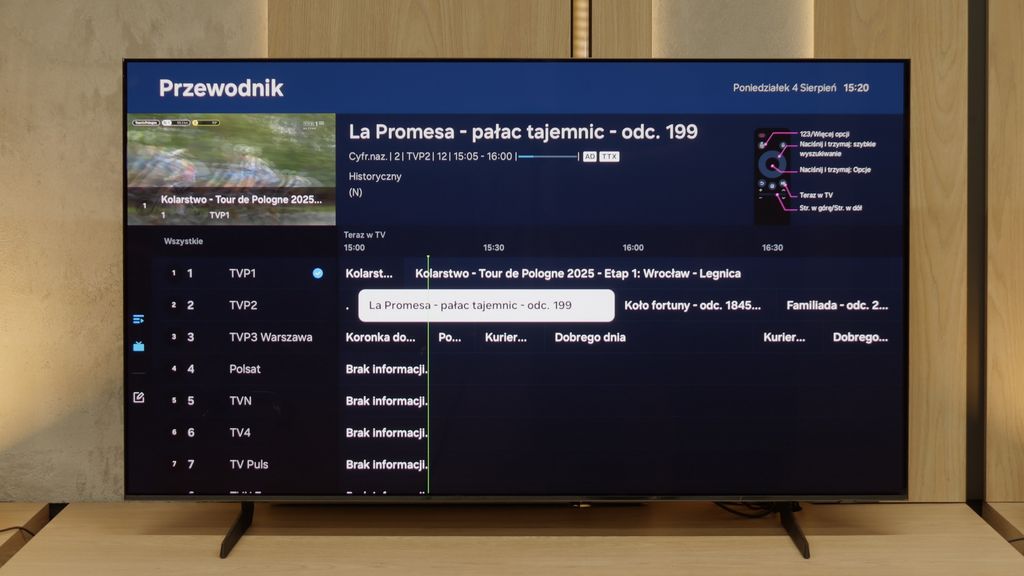
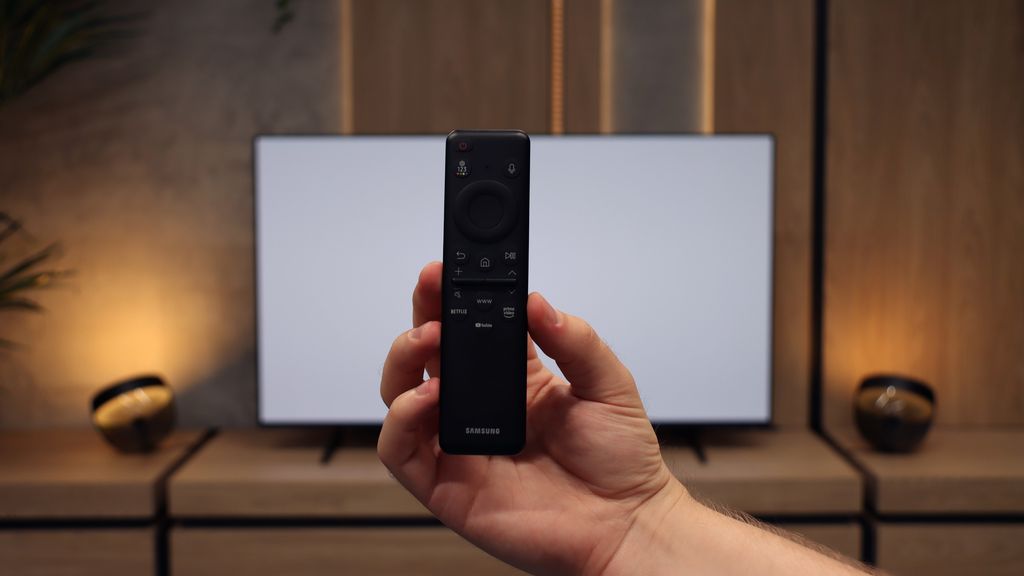
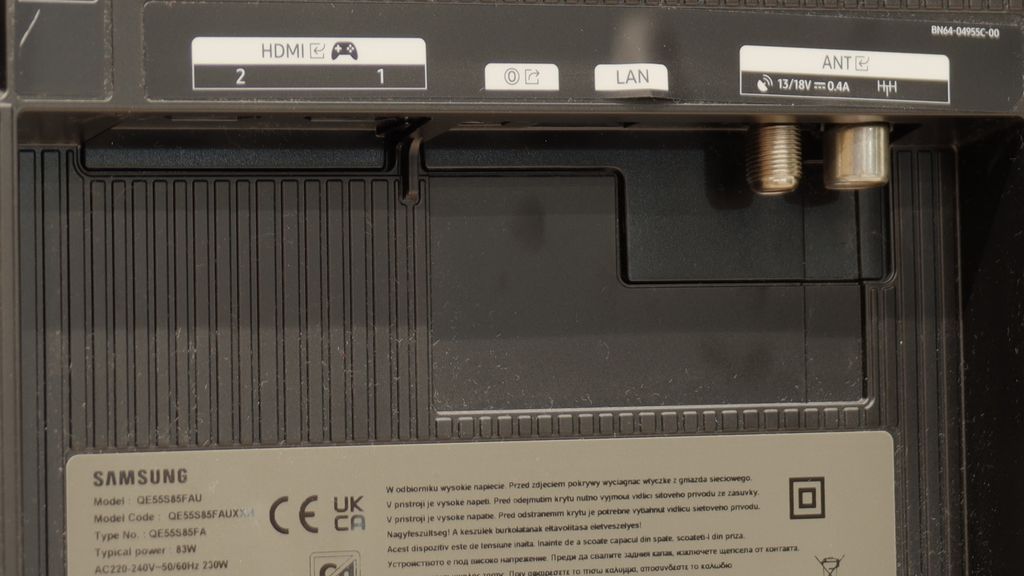
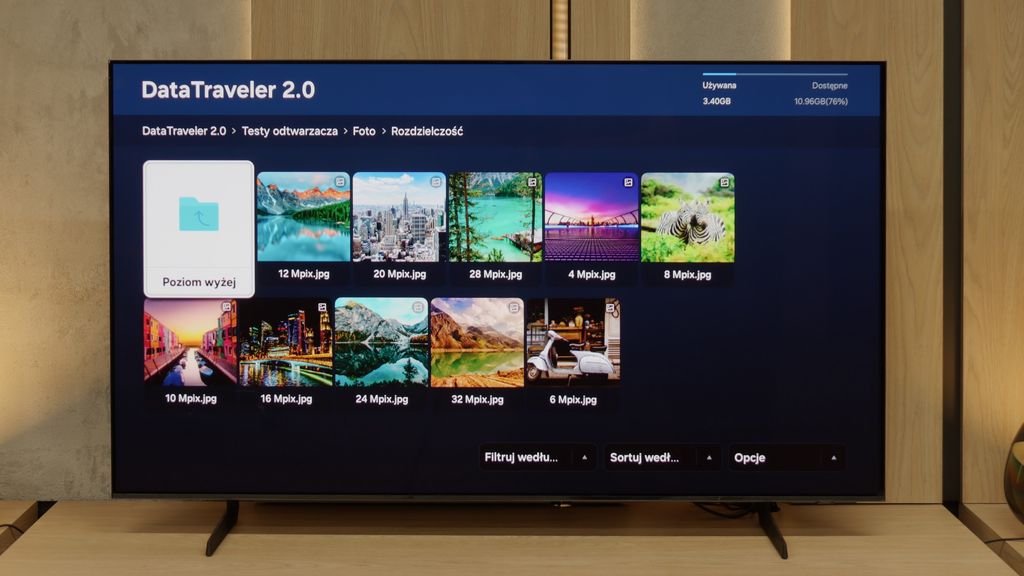
Stand: Base adjustment
Flat design: No
Accessories: Stand
At first glance, the Samsung S85F looks like its older brother, the S85D. It is one of the more interesting approaches to OLED television design, where the manufacturer moves away from the ubiquitous trend of flat-as-a-board designs with "backsides". Instead, we get a "rounded design" that can catch the eye. Looking at the S85F from the side, one might get the impression that it is a solid block, rather than a set composed of a display panel and a rear casing. Of course, this is not a premium segment – just a glance at the plastic feet, which can unfortunately spoil the whole effect. Fortunately, they can be adjusted in two widths, which makes it easier to fit the television to the furniture in the living room. Sounds like a compromise? Perhaps, but it is certainly reasonable.
Buy at the best price
Select size:
SAMSUNG S85F - Contrast and black detail
10/10
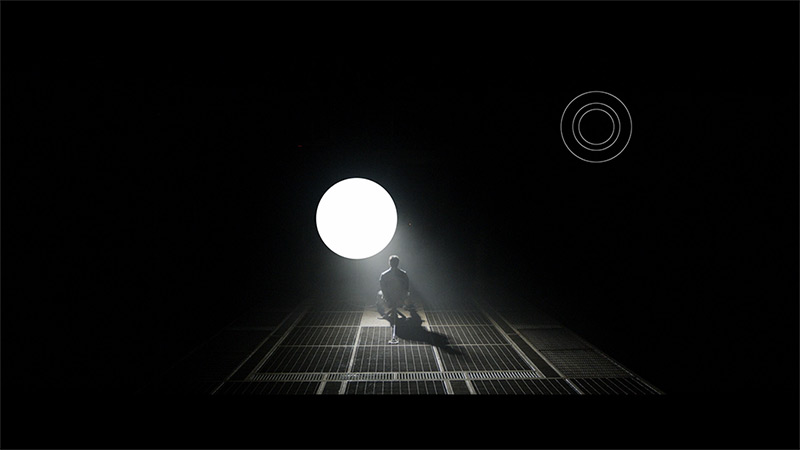
Result
∞:1
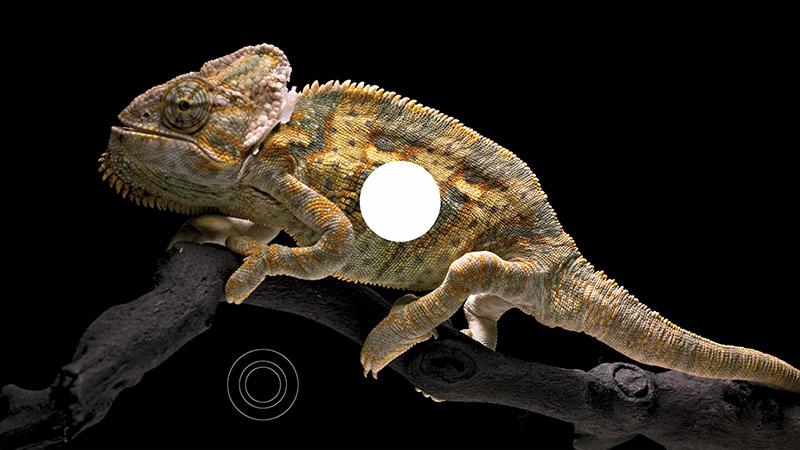
Result
∞:1
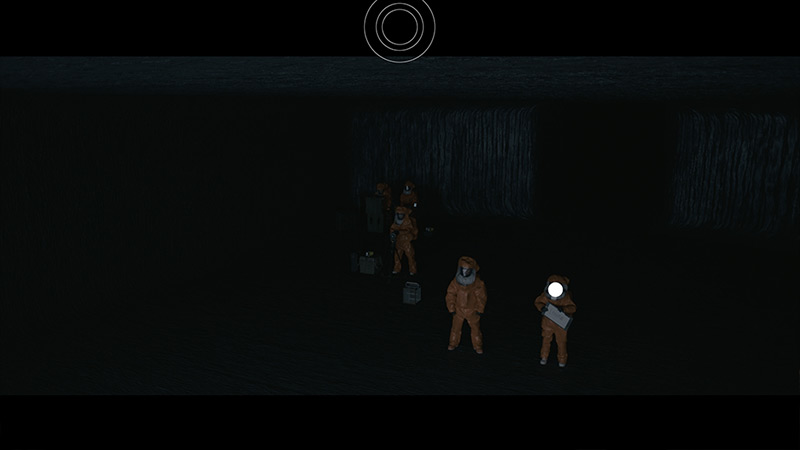
Result
∞:1

Result
∞:1
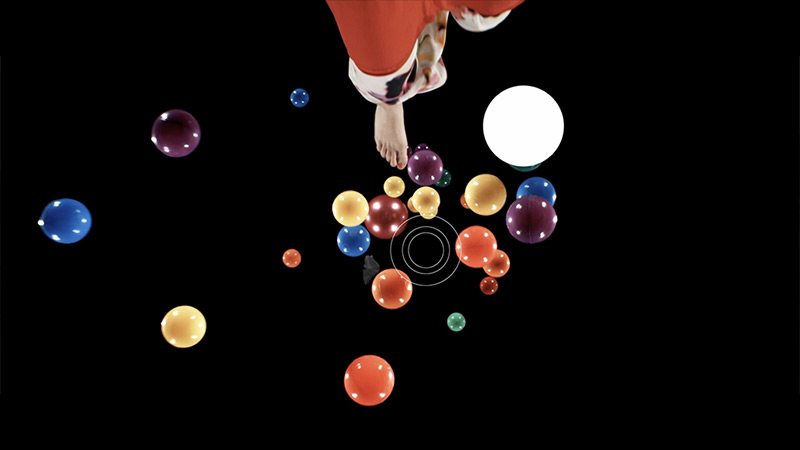
Result
∞:1
Visibility of details in the lights:
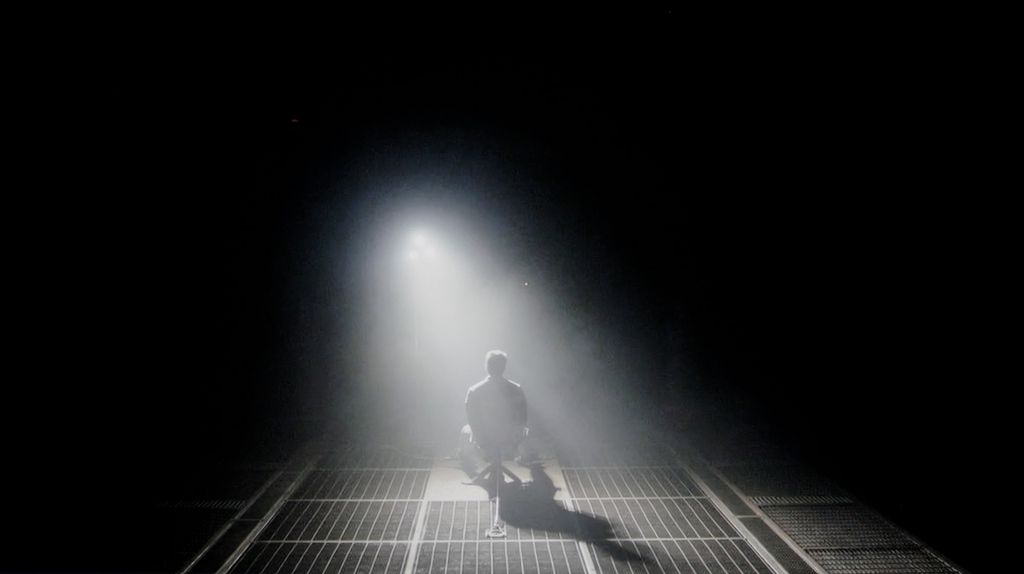
The Samsung S85F in the 55-inch version has something exceptional about it – it features a QD-OLED panel. This may sound quite surprising, but it is a fact, at least in Poland. Thus, the question arises: is the difference noticeable compared to last year's S85D with a WOLED panel? Yes, although in this particular test – black levels and contrast – it hardly matters.
Regardless of the scene, the S85F delivers infinite contrast and perfect blacks that we expect from any OLED. These are results that can impress even the most demanding cinema enthusiasts. It's worth remembering that such deep blacks can only be offered by TVs with organic panels – and it doesn't matter whether it's WOLED or QD-OLED. So, if you dream of a screen that can "turn off" the light in a scene just as effectively as an art house cinema in a dark room, the S85F is one of those TVs.
Halo effect and black detail visibility:
SAMSUNG S85F - HDR effect quality
6.2/10
Supported formats: HDR10, HDR10+, HLG Color gamut coverage: DCI P3: 100.0%, Bt.2020: 86.2%
Luminance measurements in HDR:

Result
666 nit
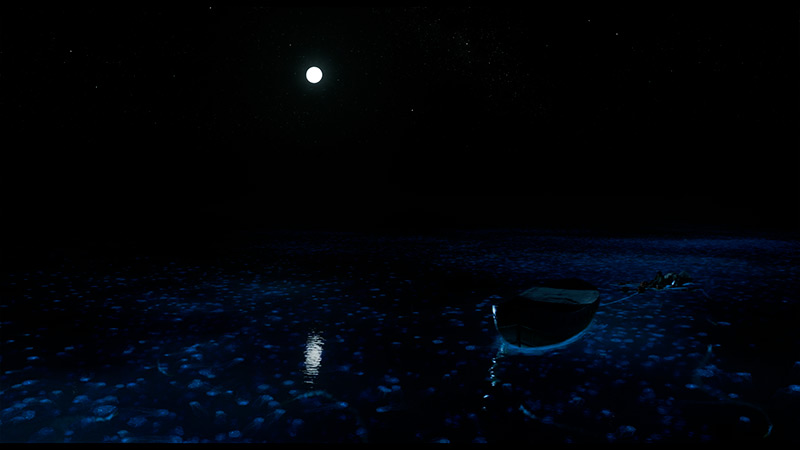
Result
703 nit
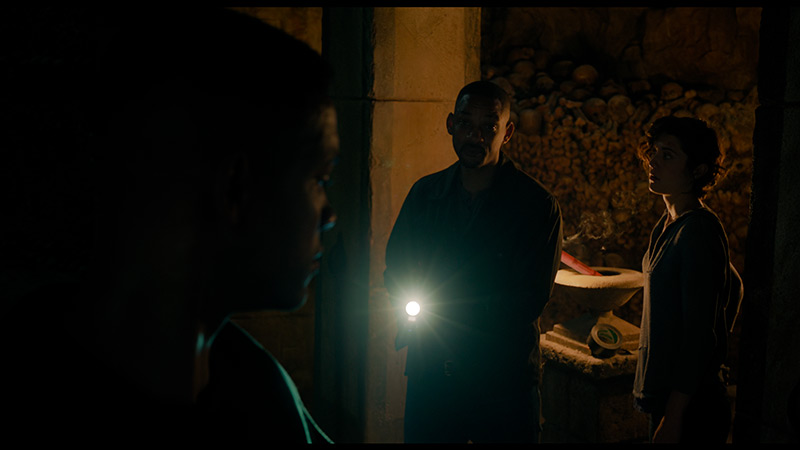
Result
742 nit
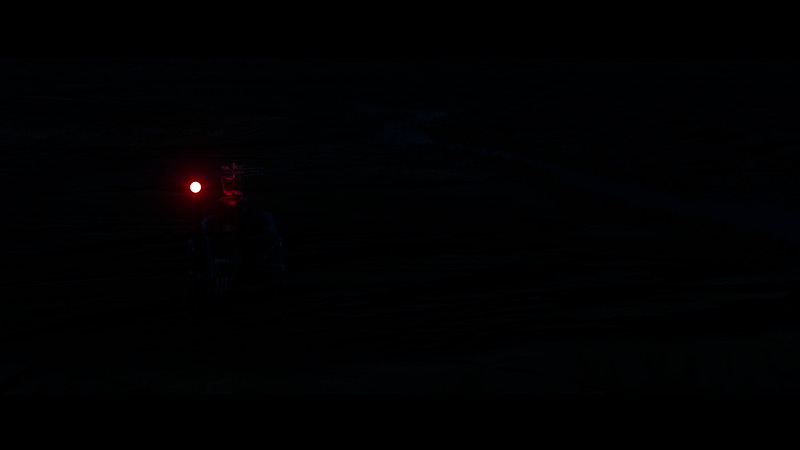
Result
732 nit

Result
433 nit
For an OLED, the Samsung S85F can truly shine – literally. Under favourable conditions, it is capable of generating brightness exceeding 750 nits. This is hugely significant, as most films are created with displays reaching around 1000 nits in mind. In practice, this means that in scenes with moderately large, bright elements, the image can look simply fantastic. However, it's not always so rosy. When there is a huge amount of light on the screen – whether it's an expansive, bright background or a whole frame filled with white – the S85F has to tone it down. In such scenes, brightness can drop by even four times. This limitation is well-known to essentially every OLED in this price segment, so we do not consider it a particular shortcoming. However, something that deserves praise and sets this model apart from the competition is its colour gamut coverage. Thanks to the QD-OLED panel, our colourimeter recorded values exceeding 100% DCI-P3 coverage and as much as 86% for the ultra-wide BT.2020 gamut. Such results are hard to find even in televisions costing several times more.
Scene from the movie “Pan” (about 2800 nits)

Scene from the movie “Billy Lynn” (about 1100 nits)

As in all our tests, we compared the S85F with the absolute top screens available on the market. And do you know what? This television did not hang its head at all. On the contrary – it stood proudly alongside the best and looked as if it had always belonged there. In typical film materials designed for displays achieving around 1000 nits, the Samsung does not lag behind at any stage of the viewing experience. The colours are as they should be, the lighting effects look correct, and the amount of detail can put to shame many flagship televisions. Does it have any weak points? Yes, sometimes – in very bright scenes – it can lose some detail in the brightest areas. But that is rather rare, unless you are a fan of material on Blu-ray discs. Perhaps a solid implementation of the feature responsible for dynamic tone mapping would improve this, but... here lies the problem. In the S85F, it operates in a rather imprecise manner and unnecessarily brightens most scenes. Therefore, without hesitation, we say – it's better not to turn it on. Nevertheless, we assess the overall experience in cinematic conditions very positively. So much so that one stops thinking about tests and simply starts watching. A round of applause for the S85F.
HDR luminance chart:
And indeed – if we look at how the S85F performs with very bright, almost completely white scenes recorded with static HDR10 metadata, it's hard to shake the feeling that this is not its strongest suit. The picture in such moments looks as if the television is somewhat unsure of how to tackle all that whiteness.
Fortunately, Samsung has equipped this model with support for dynamic metadata in the form of HDR10+. We could complain that it is not the more popular Dolby Vision, but the truth is that HDR10+ is becoming increasingly popular year by year (it recently landed on Netflix), so it's hard to consider this a real drawback. The most important thing, however, is that thanks to dynamic metadata – whether we're talking about Dolby Vision or HDR10+ – the perception of the same scene becomes completely different: more enjoyable, richer in detail, and simply closer to what the filmmaker intended to show us.
Static HDR10

Dynamic: HDR10+

Factory color reproduction
5.5/10
Samsung, as befits a manufacturer with ambitions, has equipped the S85F with a mode called Filmmaker. Its task is simple: to ensure that the colours on the newly purchased television are as true to what the director intended as possible. Sounds great… but, as is often the case, a theory that sounds great does not always translate into perfect practice.
In the tested unit, it quickly became apparent that the image – due to an excess of blue and red – looked as though someone had overdone the saturation a bit. As a result, quite significant colour errors occurred, particularly in 4K content. Moreover, there was a problem with brightness – the S85F could brighten most scenes more than it should, taking away their intended mood.
Fortunately, Samsung televisions, including the S85F, offer an impressive number of settings for advanced calibrators. This means that we could test what this panel is truly capable of when placed in the right hands.
Color reproduction after calibration
9.3/10
Thanks to the vast number of settings in the menu, we managed to bring the S85F to nearly an ideal level. The white balance in SDR content? Literally perfect – deviations do not exceed the value of “1”. So we can confidently say that in materials with not very high dynamics, we have an image close to reference here.
In HDR content, slight issues have arisen, but they are not significant in practice – most errors fall below the threshold of perceptibility, which is the value of “3”. We also managed to tame the S85F when it comes to brightness management – the EOTF curve, even in movies, holds an almost perfect line. This is one of those cases where after calibration, you can comfortably forget about the settings and simply enjoy films and series at the highest level.


SAMSUNG S85F - Smoothness of tonal transitions
8.5/10
Thanks to the QD-OLED panel, the colour blending on the S85F performs really very well. It is particularly worth noting how it handles the darkest, most demanding scenes – where most televisions start to struggle, this model operates almost perfectly.
Interestingly, a slight stumble can be noticed in those easier, brighter shots. There is then a minimal banding of colours, but it is so subtle that it is hard to believe it would realistically interfere with anyone's viewing experience.


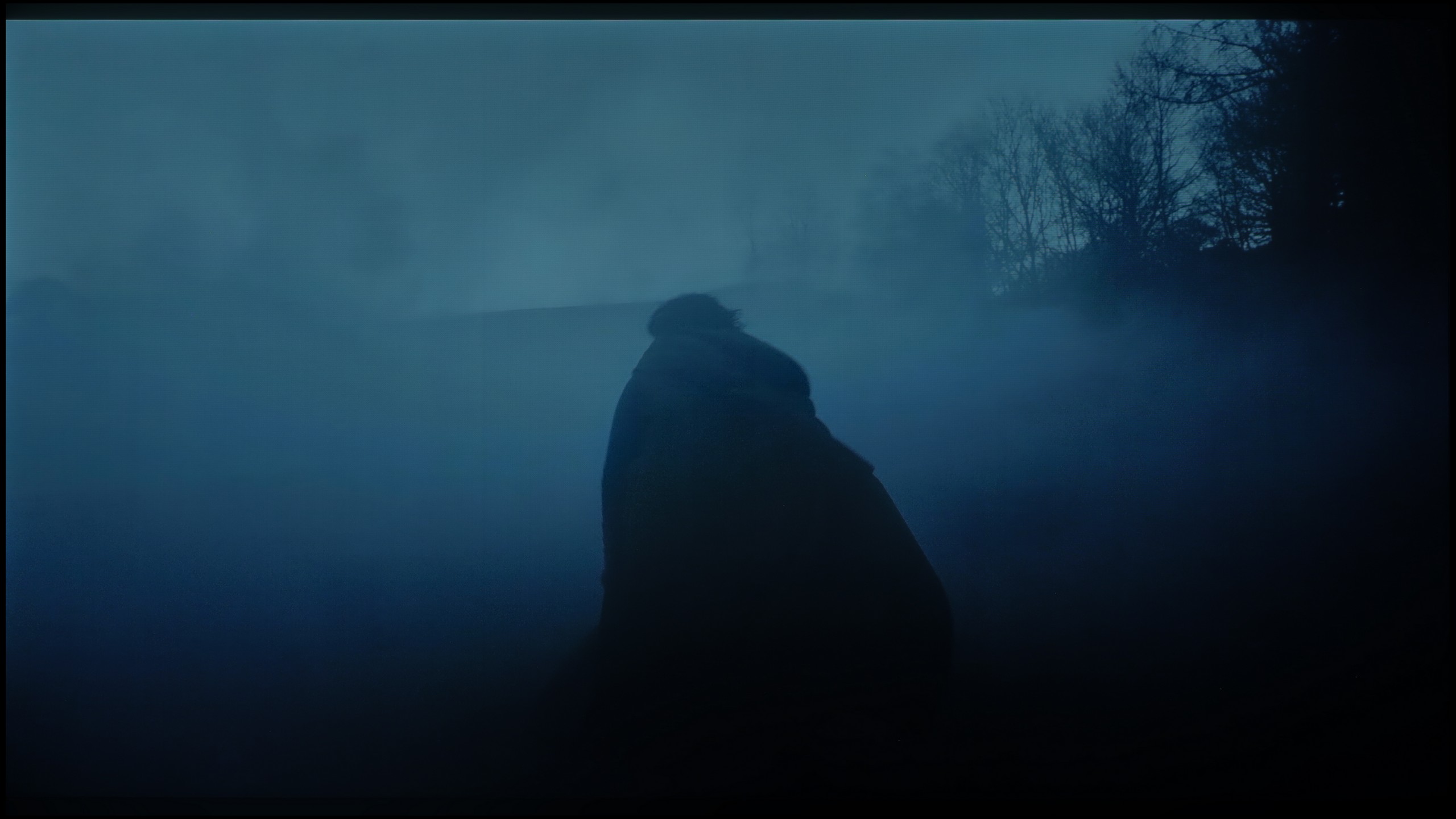





Image scaling and smoothness of tonal transitions
7.5/10
Smooth transition function
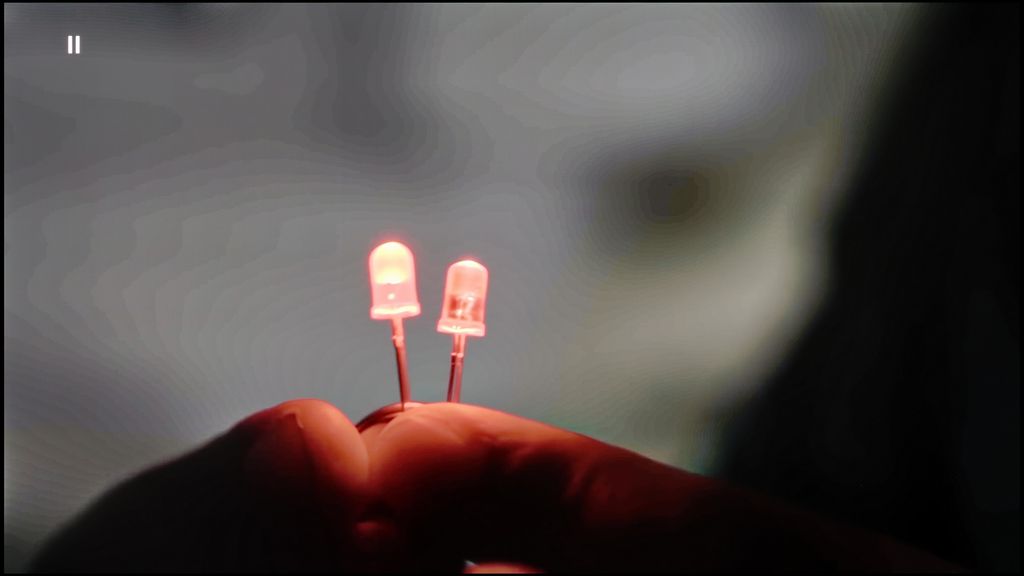
Image without overscan on the SD signal

The tonal transition smoothing function in the S85F works really effectively – it can completely eliminate the problem of visible banding in very poor quality materials, such as those from YouTube. Unfortunately, even the lowest level of this option comes with compromises. Noise reduction is aggressive enough that it can smooth out the film grain that many of us consider a key element of the cinematic experience. At the "Standard" level, we did not notice that this function removed anything significant from the image, so we can recommend this setting. On the other hand, the "High" level is a different story – it can smooth out not only noise but also subtle, desirable details such as the texture of objects.
As for image scaling, the S85F performs very well. The material looks sharp, and the only minor imperfection is slightly visible aliasing of contours. And there’s still the persistent issue with Samsung televisions – overscan. This can cause the frame to be slightly cropped in certain scenes, which is worth keeping in mind when watching very old content.
SAMSUNG S85F - Blur and motion smoothness
8.5/10
Maximum refresh rate of the panel: 120Hz
Film motion smoothing option: Yes
Blur reduction option: Yes
BFI function 60Hz: Yes, 60Hz (image flickers)
BFI function 120Hz: No
Brightness drop with BFI: 47%
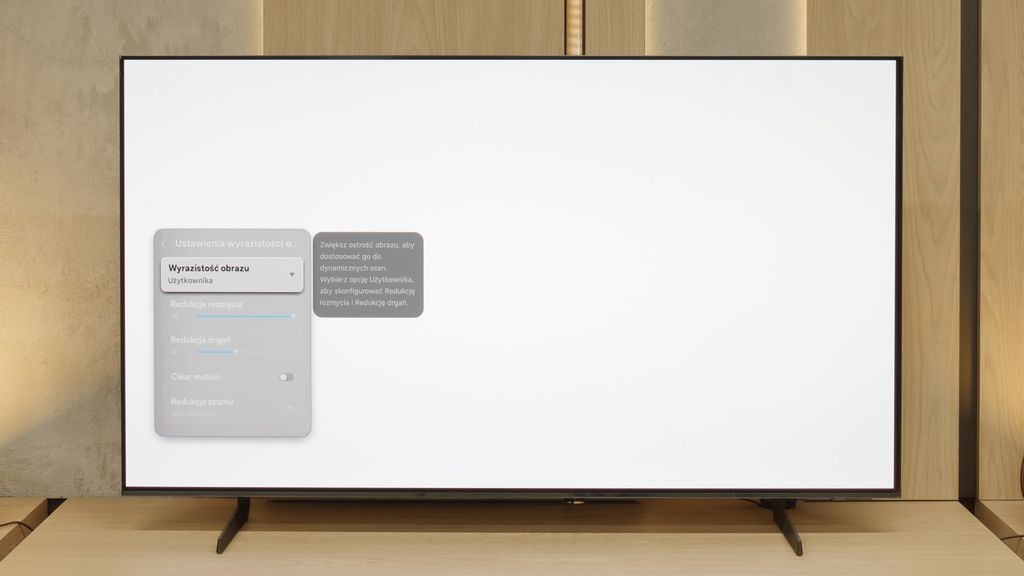
The S85F is a mind-blowingly fast television – and this is not just an empty phrase for effect. Thanks to the 120 Hz OLED panel, dynamic scenes, whether in games or while watching a live match, look exactly as they should – smoothly, sharply, and without the feeling that something is “slipping away” from the frame. The lightning-fast pixel response time, typical of OLEDs, plays its part here. Transitions between frames are virtually instantaneous, and the picture remains clear even during the fastest camera movements. A ball flying across half the pitch? A car racing in a chase scene? Here, everything is clear and free from the characteristic “trail” of LCDs.
This is exactly what we expect from a good OLED – no compromises when it comes to motion fluidity. The S85F gives the impression that regardless of the pace of the action, we can focus on what is happening on the screen, rather than the imperfections of the image.
Blur (native resolution, maximum refresh rate):



Blur (BFI function enabled):
Image flickers in this mode



Blur (4K@60Hz Game Motion Plus):



As we mentioned above – at maximum refresh rate, there is no question of any smearing, so the BFI function can be regarded more as a curiosity. Unfortunately, when it is turned on, the image flickers, and it only works at 60 Hz. However, we will show you something for the first time on our site – the lack of smearing in Game Motion Plus mode, which we often praise Samsung for. To remind you – this smoother works at a maximum of 60 frames, but the image then seems to have at least a dozen more. The effect is really pleasant and worth checking out.
SAMSUNG S85F - Console compatibility and gaming features
9.6/10
ALLM: Yes
VRR: Yes
VRR range: 48 - 120Hz
Dolby Vision Game Mode: No
Correct implementation of HGIG: Yes
1080p@120Hz: Yes
1440p@120Hz: Yes
4K@120Hz: Yes
Game bar: Yes
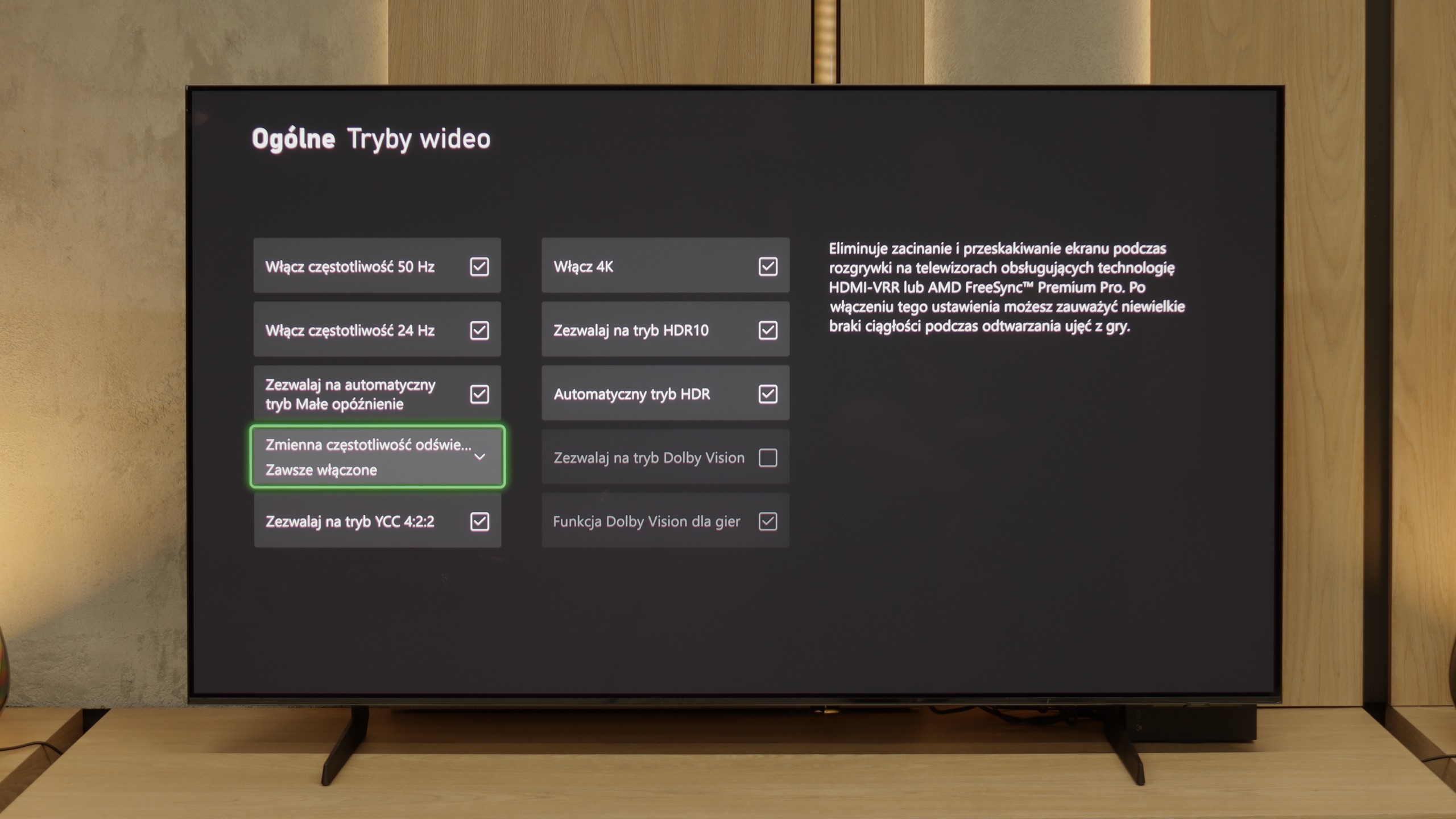
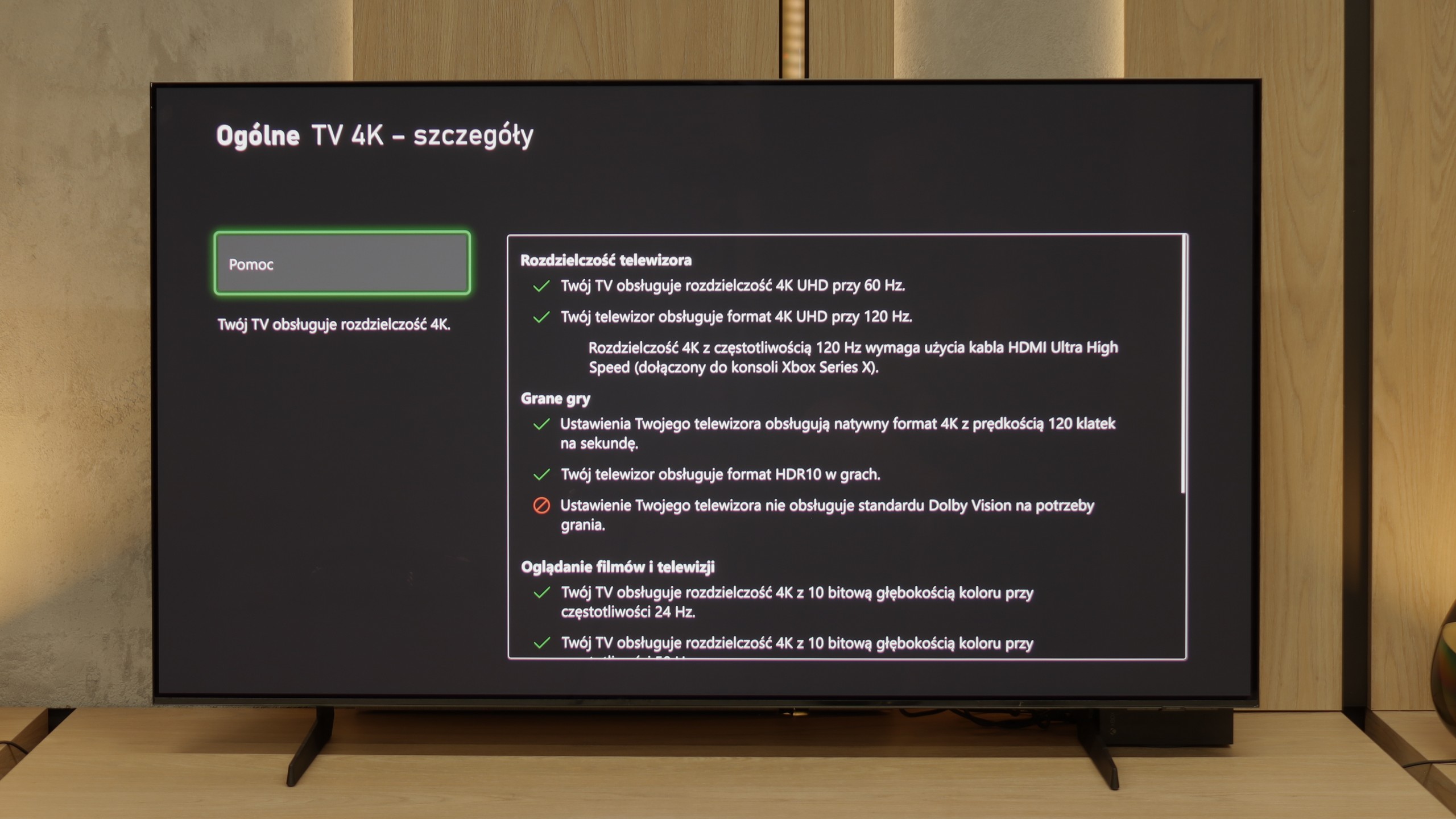
[UPDATE] We have updated our 2025 Samsung TV reviews following the release of firmware version 1131, which officially restores the essential HGiG (HDR Gaming Interest Group) support.
The S85F has practically everything on board to become the dream screen for gaming. Four full-fledged HDMI 2.1 ports with a bandwidth of 48 Gb/s, support for VRR, ALLM, a super-detailed Game Bar that clearly shows all parameters – and on top of that, a gem in the form of Game Motion Plus. This motion smoother makes animation in games more enjoyable, while input lag only increases slightly. This is a rare combination, and it’s a big plus for Samsung. Now comes the moment when we need to complain a little. The lack of Dolby Vision in Samsung televisions has become standard, so there’s no point in hoping (unless something changes in a few years) – but the disappearance of HGiG after the software update is something hard to explain. HGiG (which stands for HDR Gaming Interest Group) is a mode that allows for precise reproduction of brightness in HDR games, in accordance with the creators' intentions. Without it, HDR calibration on a console becomes less precise, so we can end up with an image that is too dark in the shadows or excessively overexposed. Perhaps Samsung will fix this in the next update – and we have high hopes for that. Because if HGiG returns, the S85F will become nearly the perfect television for gamers.
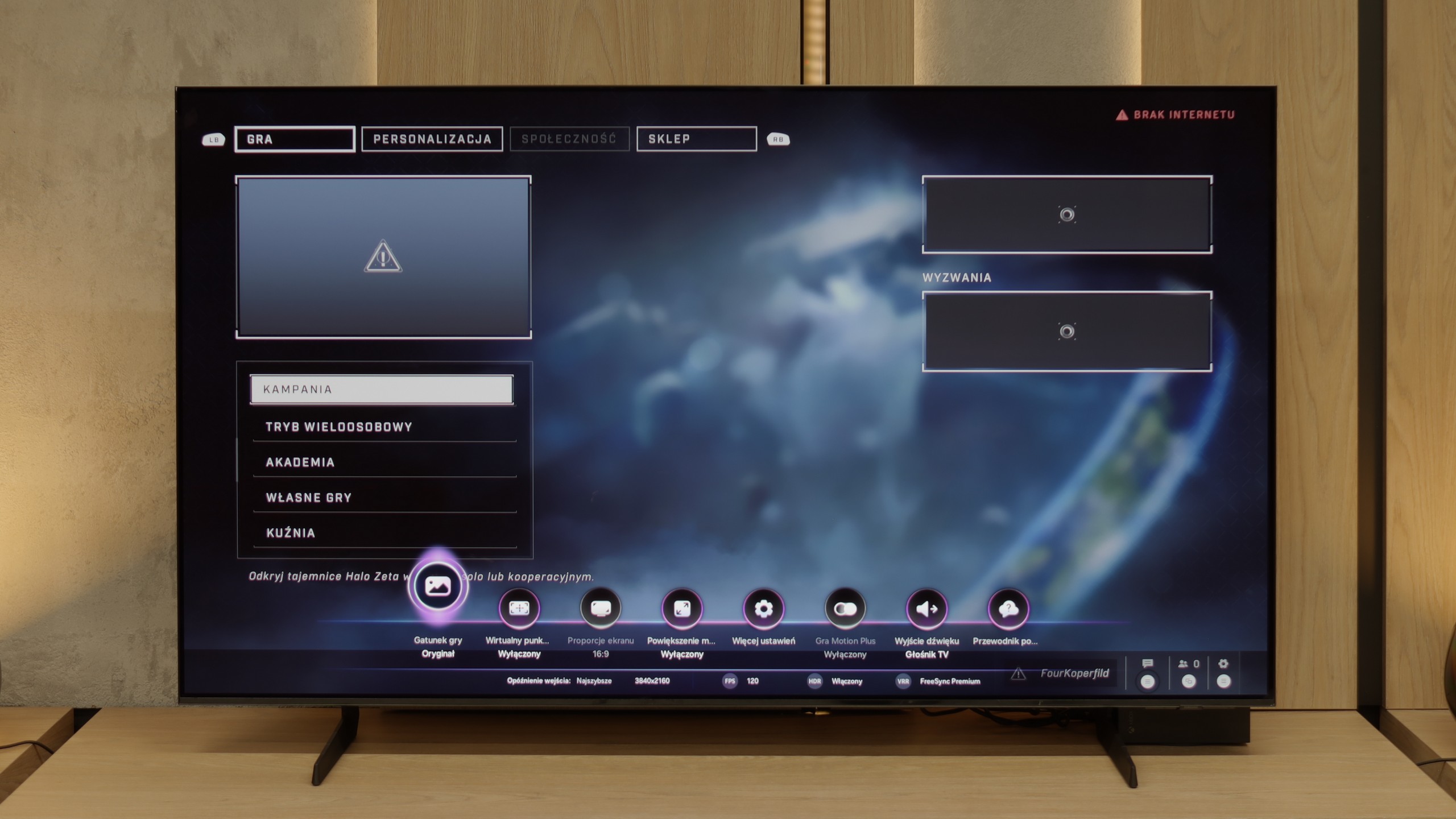
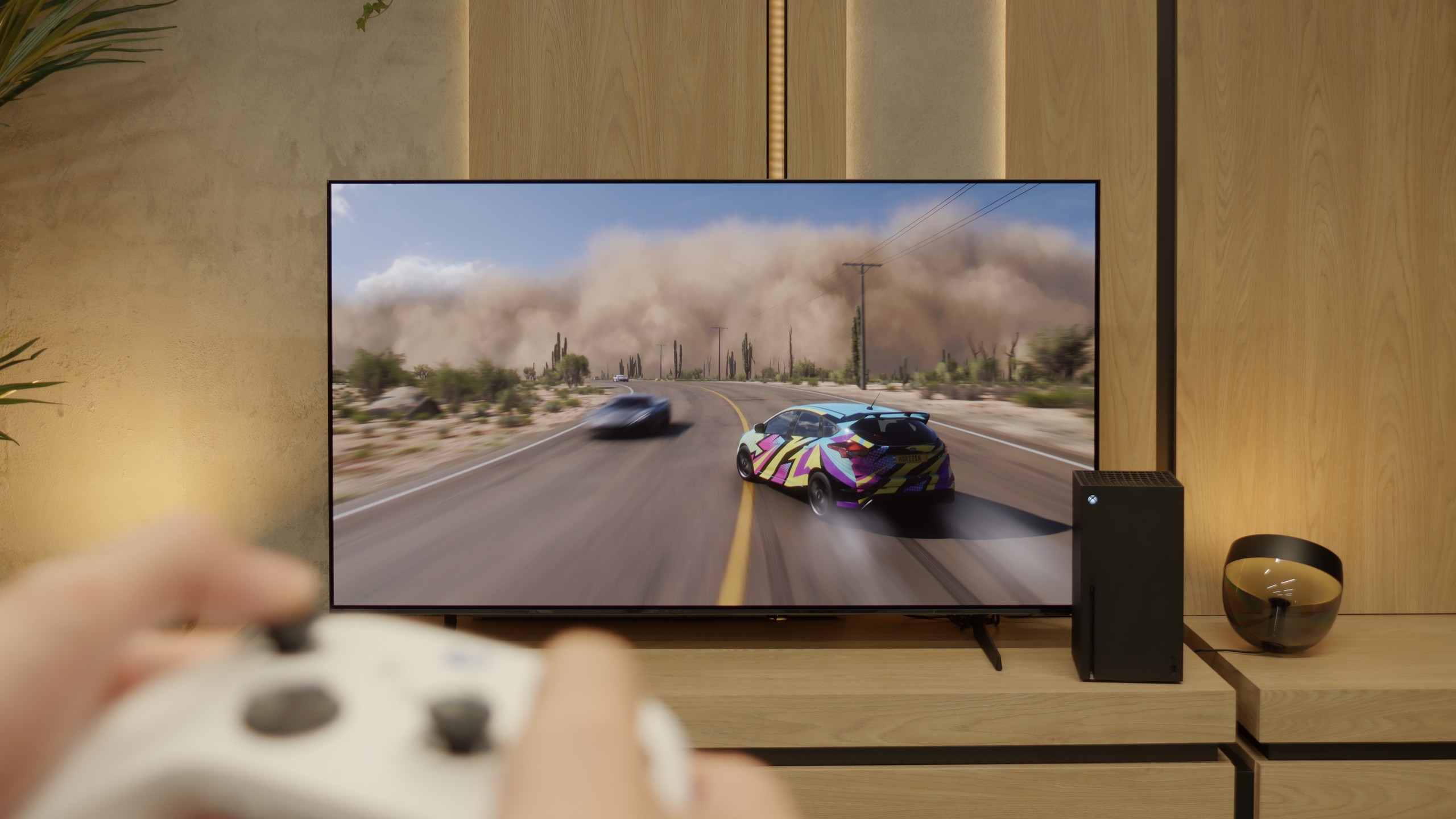

SAMSUNG S85F - Input lag
10/10
Here, dear players, the S85F shows its claws. 5 ms for 120 Hz content and around 10 ms for 60 Hz are results that can be described in one word in the world of televisions – phenomenal. This means that the reaction to our movements is practically instantaneous. We press the button, and the action on the screen happens without any delay, as if the television is reading our minds. In dynamic games, where a fraction of a second can decide victory or defeat, such values make a huge difference. There is no question of nervously "waiting" for the image to catch up with our movements. The S85F gives us the feeling that everything is completely under our control – and that is how it should be with equipment that aspires to be the perfect screen for gamers.
| SDR | HDR | Dolby Vision |
|---|---|---|
| 1080p60: 10 ms | 2160p60: 10 ms | |
| 1080p120: 5 ms | 2160p120: 5 ms | |
| 2160p60: 10 ms | ||
| 2160p120: 5 ms |

SAMSUNG S85F - Compatibility with PC
7.6/10
Chroma 444 (max. resolution and refresh rate): Yes
Font clarity: Good
Readability of dark text and shapes: Very Good
Input lag in PC mode (4K, max. refresh rate): 5ms
Matrix subpixel arrangement: RGB
Max refresh rate: 120Hz
G-Sync: Yes
If you are planning to connect the S85F to a computer, we have good news – this television is great for that. Low input lag and a 120 Hz panel make gaming on PC a pure pleasure. Whether we are talking about dynamic shooters or more tranquil RPGs, the response is instant, and the fluidity of the animations can captivate you for hours.
Of course, there's no rose without thorns. Due to the diamond arrangement of the pixels in the QD-OLED panel, there is a slight effect of "rainbow icons", particularly noticeable when sitting close to the screen. Fortunately, this is rather a detail that most of you will not find bothersome in everyday use. Especially since, thanks to the correct implementation of chroma 4:4:4, the readability of fonts is at a very good level – documents, websites, and text editors look exactly as they should.
SAMSUNG S85F - Viewing angles
9.8/10
Brightness drop at an angle of 45 degrees: 11%
Here, dear readers, the S85F reaches absolute peak performance. The viewing angles are phenomenal – one of the best you can get in a television today, thanks to the unique QD-OLED panel from Samsung Display. Of course, WOLED panels can also maintain a high level in this regard, but let's not kid ourselves – what the QD-OLED in the S85F demonstrates leaves an even greater impression. The colours, contrast, and brightness remain practically unchanged even when viewing the screen from a very wide angle. This is the kind of television where you don't have to fight for the "best spot on the sofa" – everyone will see the picture in all its glory, regardless of where they sit.
SAMSUNG S85F - Daytime performance
5.1/10
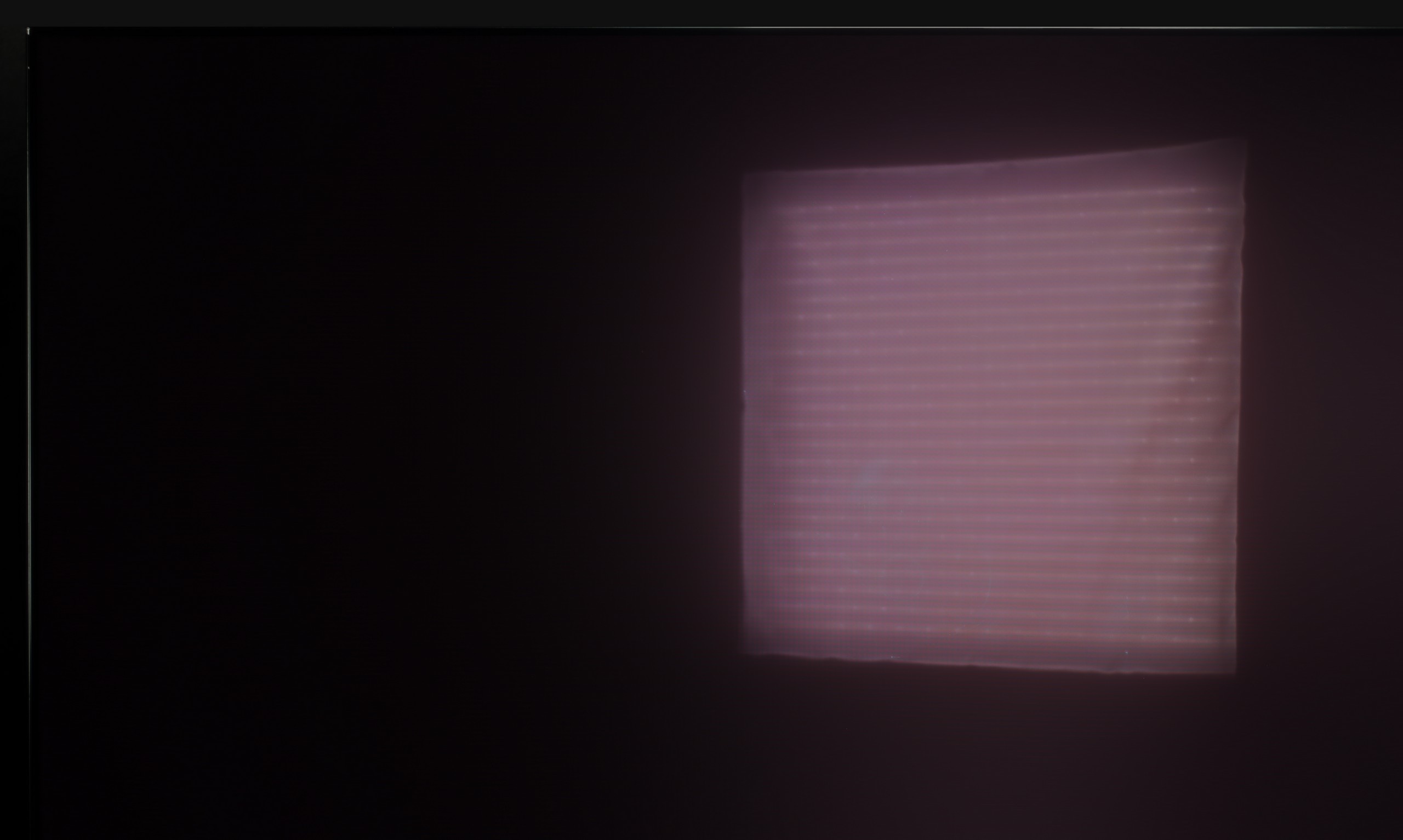

Panel finish: Glare
Reflection suppression: Good
Black levels during daytime: Average
We really liked the saying “there's no rose without a thorn” and it fits perfectly with QD-OLED display televisions. Especially when we look at their behaviour in strongly sunlit conditions. As you may notice, in very intense light, the surface of the panel can take on a slightly cherry hue. The effect is subtle in the case of the S85F, but in extreme lighting conditions, the black can perform a little worse than in WOLED panels. However – and this “however” is key here – QD-OLED significantly better suppresses direct light reflections. This means that reflections will be less bothersome, and the picture will maintain clarity even when something bright reflects off the screen. You win some, you lose some.
As for brightness, the S85F is a moderately bright OLED. It is not a model designed for extremely sunny living rooms. If you are planning to place it in a very bright room, we recommend considering blinds or placing it in a location that at least partially protects it from direct light.
Panel brightness
Samsung S85F OLED: 317 cd/m2
SAMSUNG S85F - TV features
7.3/10
System: Tizen
System performance: Good
- HDMI inputs: 0 x HDMI 2.0, 4 x HDMI 2.1 48Gbps
- Other inputs: Toslink (Optical audio)
- Outputs: Toslink (Optical audio), eARC (HDMI), ARC (HDMI)
- Network Interfaces: Wi-Fi 2.4GHz, Wi-Fi 5GHz, Ethernet (LAN) 100Mbps
- TV reception: DVB-T, DVB-T2, DVB-S, DVB-S2, DVB-C
Classic features:
Recording to USB (terrestrial TV): No
Recording programming: No
Picture in Picture (PiP): No
RF remote control (no need to aim): RF
Backlit remote control: No
Teletext: Yes
Audio only mode: Yes
Bluetooth headphones support: Yes
Simultaneous Bluetooth headphones & TV audio: Yes
Smart features:
AirPlay: Yes
Screen mirroring (Windows Miracast): Yes
Voice search: Yes
Voice search in native language: Yes
Ability to connect a keyboard and mouse: Yes




Classic TV Features of the S85F
The S85F was not really designed with fans of traditional television in mind. There’s no PiP feature (which is a bit surprising as Samsung usually offers it) nor the ability to record programmes to USB from the built-in tuners. Fortunately, the basics are present – teletext and a clear channel guide – so for regular, everyday viewing, that is more than enough. The included remote control, although simple and lacking a numeric keypad at first glance, allows you to control multiple devices. This means that when connecting, for example, a Canal+ decoder, you don’t need to have two remotes on the table – the one for the television is quite sufficient.
SmartTV S85F: Tizen
The smart part is a completely different story. Tizen is one of the most advanced operating systems in televisions. It operates smoothly, supports all popular internet functions – from screen mirroring, through AirPlay, to voice search. The strongest feature of Tizen is its integration with the SmartThings app, which can serve as the control centre for the entire home. Of course, like any closed system, Tizen has its limitations – for example, in the form of a smaller app library compared to GoogleTV. However, looking at the current list of available apps, it is hard to pinpoint anything that might actually be missing.
Sound connection options
HDMI audio:
Other audio outputs:
Toslink: Yes
Wireless audio:
Bluetooth: Yes
Samsung Q-Symphony (Speaker extension): Yes
Supported audio formats (external HDMI eARC audio):
Dolby Digital Plus 7.1: Yes
Dolby True HD 7.1: No
Dolby Atmos in Dolby Digital Plus (JOC): Yes
Dolby Atmos in Dolby True HD: No
DTS:X in DTS-HD MA: No
DTS-HD Master Audio: No
Senior accessibility
Numeric keyboard on TV: No
Font size adjustment: Yes
Audio description: Yes
SAMSUNG S85F - Apps
9.3/10























SAMSUNG S85F - Playing files from USB
9.1/10

| Maximum photo resolution: | Supported photo formats: |
|---|---|
The built-in media player in the S85F performs excellently – practically everything you put on a USB drive or hard disk will be played back without the slightest problem. Minor shortcomings appear only in the handling of some less popular photo formats, but for the vast majority of you, this will be more than sufficient. So, it can be confidently stated that for home use, the built-in player is more than solid.
SAMSUNG S85F - Sound
7.2/10
80dB
Maximum volume
Supported codecs (TV speakers)
Dolby Digital Plus 7.1
Dolby True HD 7.1
Dolby Atmos in Dolby Digital Plus (JOC)
Dolby Atmos in Dolby True HD
DTS:X in DTS-HD MA
DTS-HD Master Audio
Built-in speakers with a power of 20 W on paper may not make a big impression, but in practice, the S85F can surprise. It sounds really pleasant, and at times you can even catch a subtle bass, which is not a given in this class of speakers. The TV does not support DTS format, which has unfortunately become the standard for most manufacturers by 2025. A nice surprise, however, is the support for Dolby Atmos. Of course, talking about "spatial" sound in the case of two speakers placed at the bottom of the casing would be a slight exaggeration, but it's good that Samsung offers such a feature in this model at all.
Sound Quality Test:
Acoustic Measurements
80dBC (Max)
75dBC
SAMSUNG S85F - Panel details
Software version during testing: T-PTMFDEUC-0090-1110.7
Subpixel Structure:
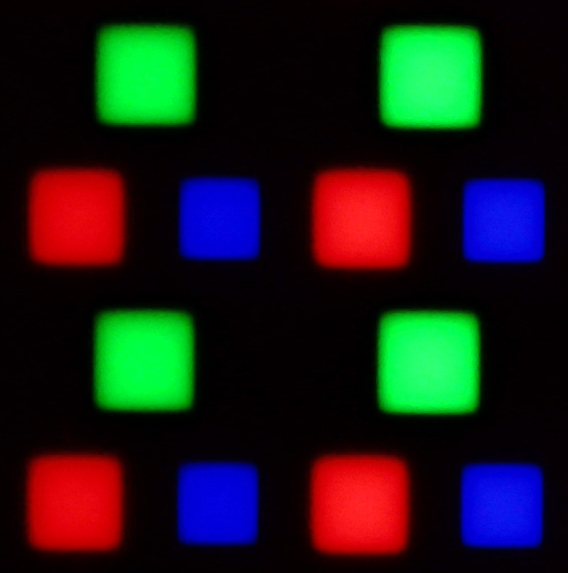
Panel uniformity and thermal imaging:

Founder and originator of the "ChooseTV" portal

Journalist, reviewer, and columnist for the "ChooseTV" portal
See articles related to Samsung S85F OLED:
12/1/2025
11/25/2025
4/3/2025
Our YouTube channel
Settings for Samsung QLED and OLED TV [Movies, Sport, TV, Ga... 10/16/2025




